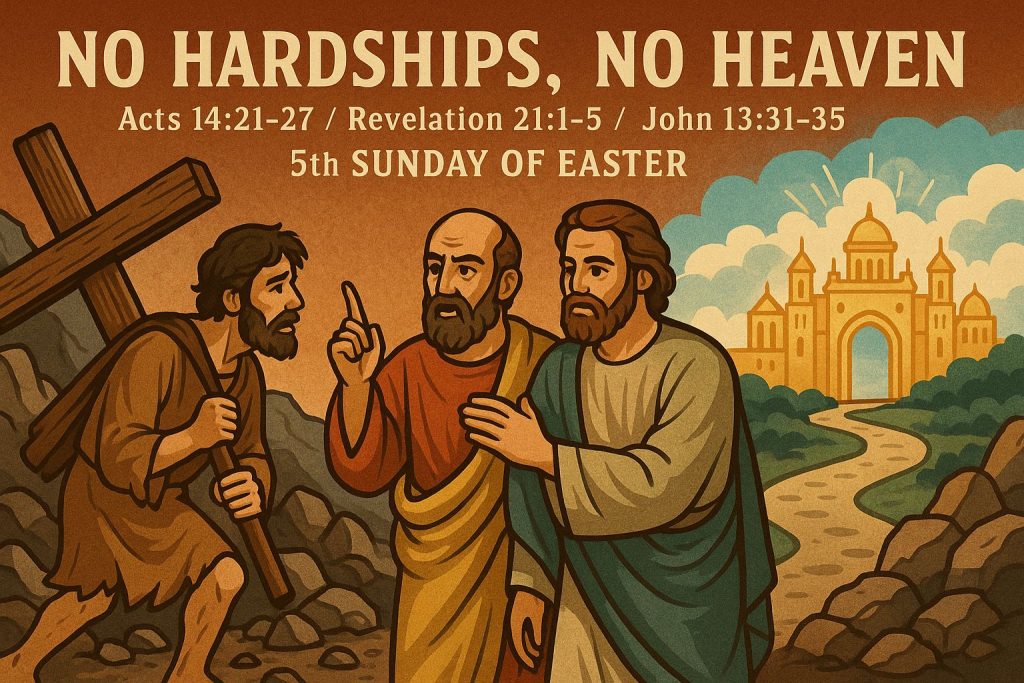MASS WITH CATHOLIC STUDENTS OF THE UNIVERSITY OF PROFESSIONAL STUDIES, ACCRA (UPSA) ON SUNDAY, 18TH MAY, 2025
THEME: NO HARDSHIPS, NO HEAVEN
READINGS: Acts 14:21-27/ Revelation 21:1-5 / John 13:31-35
5th Sunday of Easter
INTRODUCTION
The key verse for this homily is taken from today’s first reading (Acts 14:21-27). St. Paul and St. Barnabas exhort us as follows: “It is necessary for us to undergo many hardships to enter the kingdom of God” (Acts 14:22). Hence our theme: “No Hardships, No Heaven”.
- HEAVEN
Today’s second reading provides us with a picture of heaven or God’s kingdom (cf. Rev. 21:1-5). First and foremost, heaven is the abode of God (cf. Rev. 21:3). Secondly, it is a glorious or beautiful reality. The reading uses the beauty of a bride in her wedding garment to illustrate this (cf. Rev. 21:2). Thirdly, in heaven, we will experience absolute peace and joy. Hence, the reading says: God “will wipe every tear from their eyes, and there shall be no more death or mourning, wailing or pain” (Rev. 21:4).
- PASSION AS PASSAGE TO HEAVEN
According to today’s gospel reading, when Judas had left to betray Jesus, He said: “Now is the Son of Man glorified” (John 13:31). The betrayal would lead to Jesus’ passion – His suffering and death. Yet, He spoke of His glorification. Why? Because He saw His passion as a passage to return to the glory of heaven.
Using His own example, our Lord Jesus exhorts us to carry our own crosses (cf. Luke 9:23), and instructs us to enter heaven by the difficult narrow and winding path (cf. Matt. 7:13-14).
- HARDSHIPS NECESSARY FOR HEAVEN
Following the life and teachings of Jesus, St. Paul and St. Barnabas would see their hardships as necessary for entering into heaven. They endured many hardships as they travelled the world to proclaim the good news of salvation in Jesus.
In Acts 14 alone, Paul and Barnabas were persecuted by fellow Jews in Iconium, and misunderstood by some Gentiles in Lystra who took them to be gods because Paul had healed a cripple. Later, some “Jews came there from Antioch and Iconium and won over the crowds. Then they stoned Paul and dragged him out of the city, supposing that he was dead. But when the disciples surrounded him, he got up and went into the city” (Acts 14:19-20).
Paul and Barnabas returned to Lystra, then on to Iconium and Antioch. There, they exhorted the Christians, saying: “It is necessary for us to undergo many hardships to enter the kingdom of God” (Acts 14:22).
If Jesus, Paul, Barnabas and the other apostles saw hardships as necessary for entering God’s kingdom, why do many Christians today consider trials or difficulties as unnecessary burdens or worse still as incompatible with the Christian life?
- ENCOURAGEMENT OF STUDENTS
Dear Catholic students of the University of Professional Studies, Accra (UPSA), the message of “No Hardships, No Heaven” is applicable to your academic life and life after graduation. Here, let me limit myself to the former.
As hardships are requirements for entering into heaven, so there are requirements for passing each of your courses as well as for graduating. You need, per your Students’ Handbook, a minimum score to pass each course, and for your graduation, you are required to have a certain minimum total credit hours and a minimum final grade point average. You should, therefore, work hard to attain the minimum or preferably, the highest scores/grades. Besides studying hard, you may have to endure failures, sickness, inadequate finances, theft of your belongings, etc.
It is my prayer that like our Lord Jesus, Paul and Barnabas, you will endure all such hardships till the end, and so enter joyfully into the “kingdom of graduates” on the day of your congregation.
CONCLUSION
Beloved, heaven is exceedingly glorious, peaceful and joyful, and forever so, because of the eternal and full presence of God therein! Let us, therefore, with the help of God’s grace, endure all the hardships necessary for our entry there. Finally, may all students who bear with the hardships of academic life, graduate with the higher honours! Amen!
By Most Rev. John Kobina Louis
